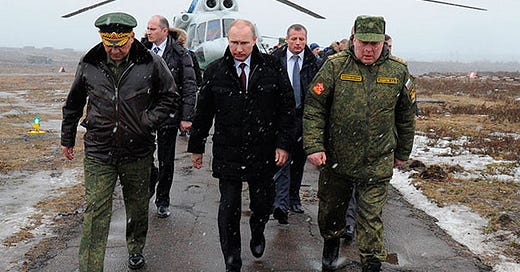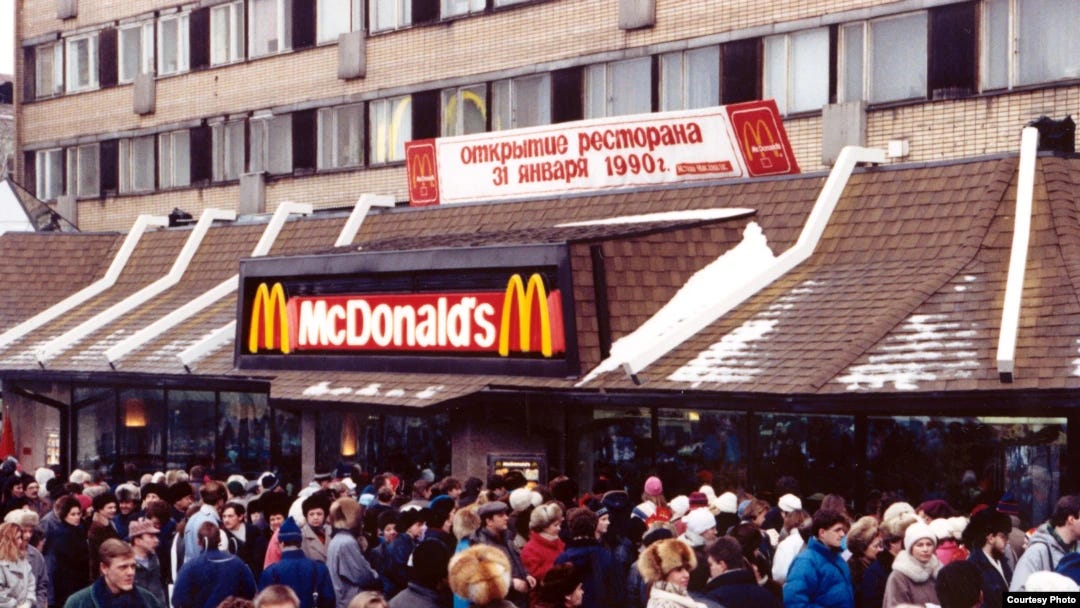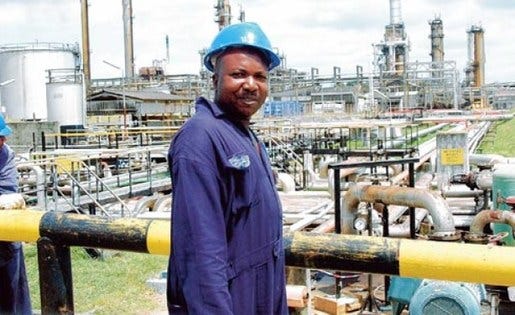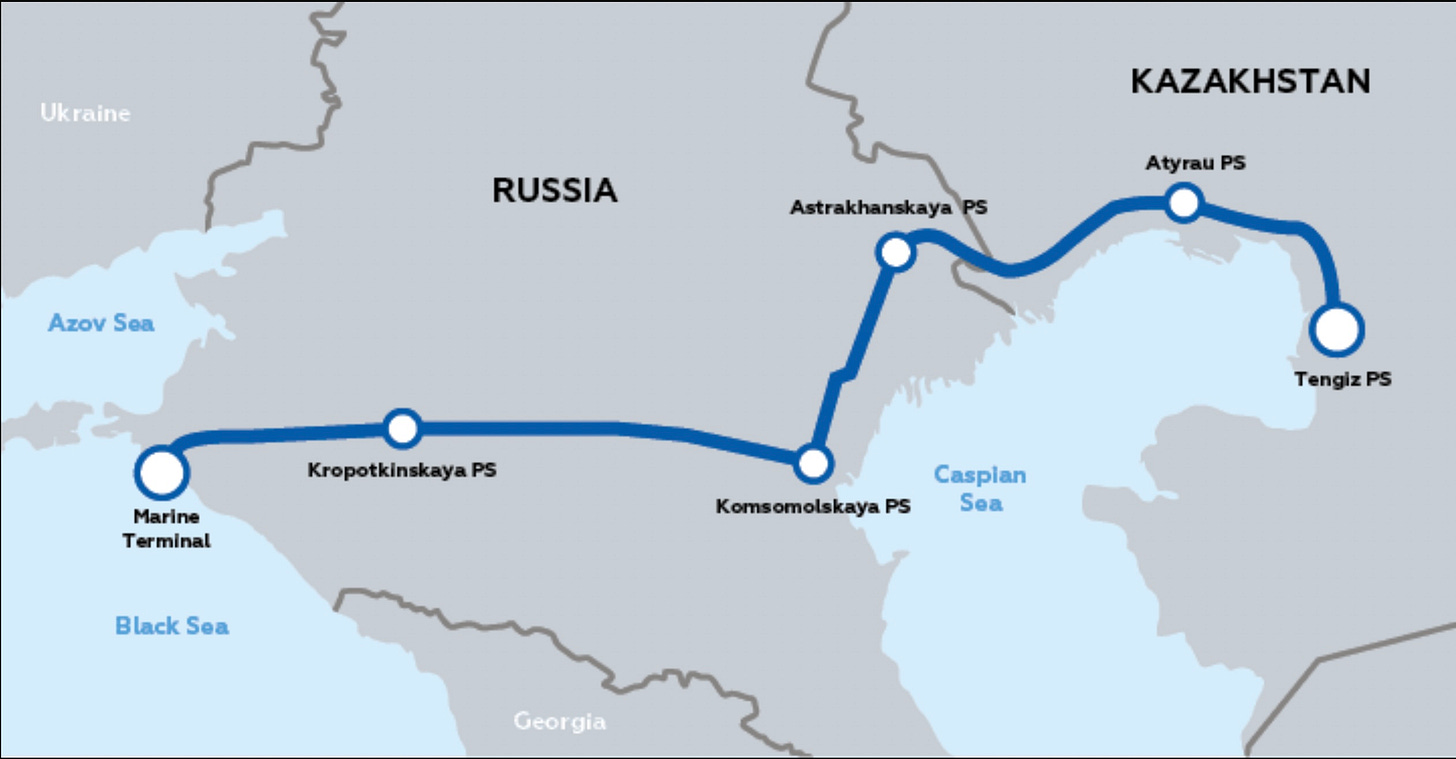Emerging Markets Daily - March 9
Russia to Ban Commodity Exports, McDonald's and Starbucks Exit Russia, Kenya Oil Discovery, S. Korea Election Too Close to Call, Kazakhstan Faces Economic Crisis
Russia Set to Ban Commodity Exports After Western Sanctions
Wall Street Journal
“Russian President Vladimir Putin is banning exports of certain commodities and raw materials, according to a decree issued Tuesday evening in Moscow.”
“The actual commodities that will be banned from export will be determined by the Russian cabinet, the decree said. Mr. Putin gave them two days to come up with a list of countries subject to the ban.”
“The decree came hours after President Biden said that the U.S. would ban imports of Russian oil over the country’s invasion of Ukraine and the European Union said it would aim to cut imports of Russian natural gas by two-thirds this year. The U.K. government also said Tuesday it was phasing out Russian oil imports by the end of 2022 and is exploring options to end Russian gas imports altogether.”
“Russia is the third-largest oil producer in the world and the biggest exporter of natural gas. The exports fuel Russia’s economy and the West was believed to be too dependent on them to quit easily. The invasion of Ukraine changed that dynamic.”
“Oil prices rose following Mr. Putin’s decree. Brent-crude prices, the international benchmark, extended earlier gains to trade 5.9% higher at $130.50 a barrel, before slipping back. They remained below the high of about $139 a barrel recorded on Monday.”
“Russia is also a major supplier of grains and metals such as aluminum, nickel and palladium. A sweeping ban on exports could upend global commodity markets. Nickel hit an all-time high today.”
“The decree was a follow-up to earlier measures taken by the Kremlin in retaliation for Western sanctions. It described the goal of the commodity-export ban as ‘ensuring the security of the Russian Federation and the uninterrupted functioning of industry.’ The ban will be in effect until Dec. 31, according to the decree.” WSJ reports.
McDonalds, Symbol of Post-Soviet Capitalism, Closing All Stores in Russia; Starbucks, Symbol of Globalization, Follows Suit
Channel News Asia
“McDonald's said it would temporarily close all 847 of its restaurants in Russia including its iconic Pushkin Square location, increasing pressure on other global brands to pause operations in the country following Moscow's invasion of Ukraine.”
“The closure of the McDonald's restaurants will also carry symbolic importance in Russia, where the first location to open, in central Moscow in 1990, became a symbol of flourishing American capitalism as the Soviet Union fell.”
“McDonald's said it would continue to pay salaries to its 62,000 employees in Russia. Because of its large size and global reach, the chain is often copied by other brands if it takes a stance on an issue or makes a major operational change.”
“McDonald's opened in Pushkin Square 32 years ago as the Soviet Union was collapsing. That new restaurant represented the thawing Cold War tensions at a time when some young Russians were desperate to get their hands on blue jeans and other Americana.”
“Starbucks CEO Kevin Johnson wrote that its licensed partner ‘has agreed to immediately pause store operations and will provide support to the nearly 2,000 partners in Russia who depend on Starbucks for their livelihood.’”
“The Starbucks announcement came the same day that McDonald's announced a suspension of its business in Russia, as pressure has been mounting and calls for repercussions appeared on social media under hashtags such as #BoycottMcDonalds.” Channel News Asia reports on McDonalds and on Starbucks.
Kenya on Verge of Announcing Major Oil Discovery
The East African
“Kenya is just weeks away from announcing the discovery of new oil resources in the Lamu basin, bigger than what was found a decade ago in Turkana, in what could be a turning point for the country’s dreams of reaping petrodollars.”
“Italian oil exploration company Eni — in partnership with France-based oil and gas company TotalEnergies and Qatar’s state-owned oil and gas firm Qatar Energy — is racing to conclude a five-kilometre exploratory drilling deep water well that will establish the potential oil resources in the Lamu basin.”
“The oil resources that can be recovered from the Block L11B are estimated at about 700 million barrels according to early conservative estimates, more than a fifth of Turkana’s commercially extractable volume of 585 million barrels.”
“The large fiscal windfall associated with new oil resource revenue could help Kenya boost development and improve the standards of living for citizens through access to key services and amenities such as roads, health, food security and education.”
“The well is located approximately 170km from the coast, underneath the Indian Ocean seabed where Eni has been prospecting and drilling for oil.” Brian Ngugi reports.
South Korea Election Too Close to Call
Bloomberg
“South Korea’s presidential race was too close to call as votes were being counted, with an exit poll released minutes after polls closed Wednesday showing conservative candidate Yoon Suk-yeol with a lead of less than one percentage point.”
“Yoon had 48.4% of the votes, compared with 47.8% for progressive candidate Lee Jae-myung of the ruling Democratic Party, a joint exit poll by three major TV broadcasters showed. A separate exit poll by JTBC TV network showed Lee with 48.4% of the votes compared with Yoon’s 47.7%. Final official results are expected to come later in the evening or early Thursday morning.”
“A victory for Yoon would return a hawk to the presidential Blue House, likely leading to a stronger embrace of South Korea’s military alliance with the U.S. and support for the Biden administration’s push to bring in allies to build supply chains for crucial items, such as semiconductors, that aren’t dependent on China.”
“It could also mean a chill for relations with neighbors North Korea and China after Yoon said he backed the option of a preemptive strike if Pyongyang posed an immediate threat and called for a new deployment of a U.S.-made missile interceptor system known as THAAD.”
“A former factory worker who later became a civil rights lawyer, Lee, 57, has been in politics for more than 15 years as a member of the progressive camp -- becoming governor of heavily populated Gyeonggi province surrounding Seoul in 2018. He has pushed to make the country Asia’s first to introduce universal basic income.” Bloomberg reports.
Kazakhstan Faces Economic Crisis as War Threatens Its Crude Transit Routes
Eurasianet
“Kazakhstan is facing economic crisis as the war in Ukraine threatens crude oil exports, which alone account for around 14 percent of GDP and 57 percent of exports.”
“The bulk of these oil exports pass through a pipeline from Kazakhstan’s western oil fields through southern Russia to Russia's Black Sea oil terminal at Novorossiysk. The pipeline, owned by the Caspian Pipeline Consortium (CPC), can handle around 60 million metric tons a year.”
“At just 200 kilometers from the Ukrainian port of Mariupol, where some of the fiercest fighting is underway, Novorossiysk is close enough for oil tankers to incur a ‘war risk insurance premium,’ which according to energy news agency S&P Global Platts has been high enough to deter buyers since the Russian invasion of Ukraine began last month.”
“Platts reported that shippers have been cancelling scheduled bookings to collect tanker loads of crude from Novorossiysk. One of the main destinations for crude exported from the terminal is the Ukrainian port of Odessa where it is fed into a pipeline network to Europe. With Odessa expected to come under Russian bombardment within days, that route is effectively closed.”
“Production at Kazakhstan's giant Chevron-operated Tengiz oil field and oil flow through the CPC pipeline is continuing as normal, although thanks to the ‘war risk’ the price of Kazakh crude has fallen, despite global oil prices soaring to their highest since 2008.” David O’Byrne reports.
“Everyone has a plan…until they get punched in the face.” - Mike Tyson






